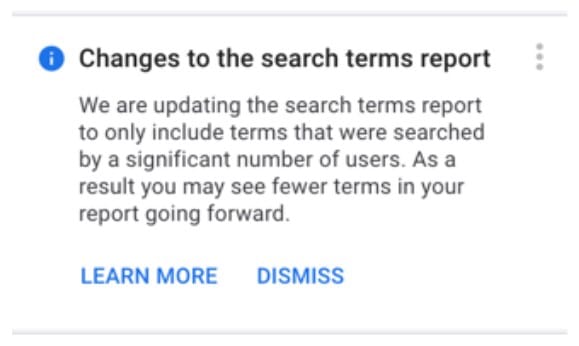Google Ads has recently stopped showing search queries in the search terms report that triggered ads for searches where there is not what they consider to be “significant” data as indicated in this notice.

This means that, when reviewing search term reports beginning with September 2020, you’re seeing less useful data with decreased visibility into the actual search queries driving clicks, cost, and yes, even conversions!
Unfortunately, this diminishing transparency is not good news from a Google Ads optimization standpoint. Google is now providing advertisers with less access to the critical information used to help improve performance through either negative keyword management or data mining for additional high-performance keyword expansion.
Impact on Negative Keyword Management
With less comprehensive access to the volume of search queries triggering ads, there is greater potential for less relevant traffic coming through on terms. This means that certain traffic volume which would historically be considered wasteful spend will now remain undetectable.
As a result of Google’s previous expansion of “close variants” triggering exact match keywords, advertisers already have much less control over the queries that trigger their ads. This has required an increased focus on negative keyword management.
However, the negative keyword management approach is now also being limited by Google’s diminishing advertiser access to search term report data. This can be especially detrimental for industries that carry high costs-per-click (CPCs), as they will now be stuck footing the bill for search queries that may be lacking the desired level of relevance.
Impact on Positive Keyword Management
Adding high-performing search terms to your ad groups as keywords has long been a successful practice for productive keyword expansion. Now, with Google’s change, there is simply less data available for mining.
This search term reporting change is especially impactful for any dynamic search ads (DSAs). In this specific ad type, there are no corresponding keywords to reference, so all of the analysis and optimization is reliant upon the data from search terms themselves — which is no longer completely available.
This situation is very alarming as we have seen some instances where the missing search queries have accounted for as much as 25% to 40% of the monthly spend.
One example of this is a JumpFly client that focuses on lead generation. In September, the missing search query data accounted for 23% of the clicks and cost, as well as 22% of the conversions.
In another case, we found that an ecommerce advertiser running a DSA campaign had missing search query data representing 40% of conversions, and $37,000 in revenue.
The initial reaction by many experts in the paid search industry has been one of deep frustration along with much skepticism. This latest development represents another “update” further limiting transparency within Google Ads and binding the hands of paid search professionals.




